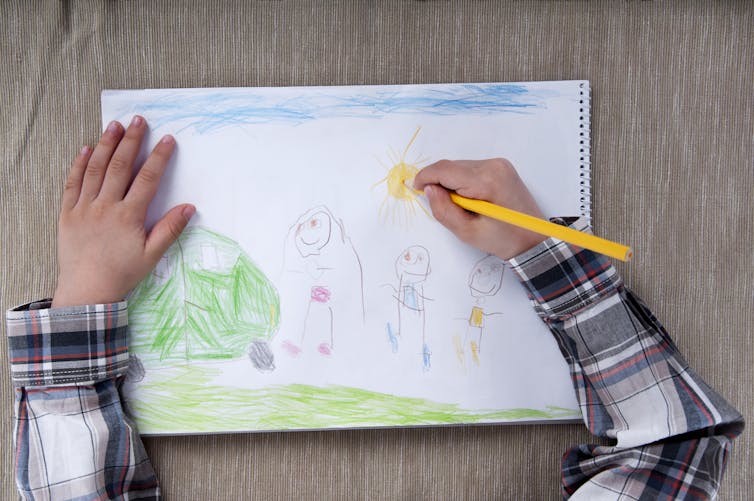The UK prison population has risen by around 74% since 1990, with 78,037 people now serving sentences. Research shows that taking part in educational activities while serving a sentence can help people cope with prison life and reduce reoffending.
There is an education department in every prison typically offering academic courses such as literacy and numeracy, and vocational courses such as joinery and bricklaying. However, numbers of people engaging in prison education are declining as it becomes increasingly undervalued and under-resourced. So, it’s vital to develop engaging educational activities in prisons.
One way to do this is to link education with family activities. Around half of the people in prison have children. Maintaining good relationships between parents and their children during a sentence can reduce reoffending and help people to reintegrate with their families upon release. It can also help children to better cope with someone close to them being in prison.
However, it is challenging to maintain family relationships because of the lack of meaningful contact between prisoners and their children. With our White Water Writers project, we believed that linking education with family activities would encourage prisoners who might not typically participate in education to get involved, and help foster better family relationships.
White Water Writers (WWW) gives groups of eight to ten people the opportunity to collaboratively plan, write and publish a full-length novel in just one week. Books go on sale online and the authors receive professionally printed copies of their novels. Originally developed in schools, WWW has enabled more than 3,000 young people to become published authors.
We decided to run the project in a prison to provide an engaging and motivating educational opportunity. We linked the work to families by inviting participants to write a novel for their children, who would then produce the illustrations for the book. Our research explored the impact WWW had on both the prisoners and their families.
Writing from experience
Eight men from a prison in England took part, and were given four days to collaboratively write and publish a novel for their children, supported by a facilitator and prison staff.
A key principle of WWW is that no one from outside the group is involved in developing the plot, writing or editing. On the first day, each writer created their own character and, together, the group developed the plot. On the second and third days, they collaboratively wrote their novel. On the fourth day, they proofread it – and then the final day was a family day, where children visited the prison and produced the illustrations.
While the writers were initially a little daunted at the prospect of writing a novel, they worked hard to produce something their children would enjoy – the result was an exciting fantasy adventure of around 8,000 words. To understand the impact of the project, we then interviewed the writers, their families and prison staff about their experiences, as well as analysing their novel.
Messages of hope
The book helped the children to better understand their fathers’ experiences. It had two main themes: “people not being bad” and “people changing for the better”. The villains in the book are not bad people. Rather, they experience difficult circumstances which lead to challenging emotions, and these in turn lead to bad behaviours.
However, by the end of the novel, the villains are reformed. For example, one character, who is a bear, is in prison at the start of the book but wants to change his life. The book ends with him putting his life at risk to save the world.
Many of the writers included their own children in the novel as characters. This helped them connect with their children, who enjoyed seeing themselves in the book. One participant said he wrote the plotline of his daughter becoming braver in the story to help her deal with the anxiety she was feeling about moving to a new school.

The writers said they would not have engaged with WWW if it had not been linked to their families. The family visit day was an incentive, and they enjoyed creating something tangible for their children. All the authors said they improved a range of skills including writing, typing, computer skills and “soft skills” such as teamwork.
As many had negative experiences of education and few had any formal qualifications, they did not expect to complete the novel. Their success led them to feel proud of themselves: “The fact that I can write a thousand words, I am stunned,” one said.
The project also led the men and their families to feel more connected to each other. Family members discussed feelings of pride in what the writers had achieved.
We even discovered that one of the children had dressed as her character for World Book Day at school. She told her teacher about the book, and the class then used it as their reading book. One member of prison staff said:
How that child must feel to have something positive from her daddy and to share that with her classmates. I certainly didn’t expect that, and I think it’s a massive success and has obviously had an impact.
This suggests that linking projects with families, where appropriate, may be a way to increase engagement with education and provide meaningful opportunities for contact between people in prison and their families. This will have positive results not just for those in prison, but for their families as well.

